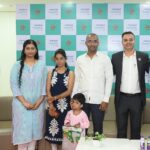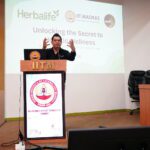“Advisory by Dr. Zeenat Ahmed, Internal Medicine Specialist, Jaypee Hospital, Noida”
New Delhi, August 23, 2018:
Monsoon season is a blessing in disguise as it allows us to escape from the scorching heat of Delhi. But with some relief it also brings “season of diseases.” It is very important to be careful during monsoon as one become prone to infection, allergy, or indigestion. The rainy season is associated with wetness and excessive humidity. This helps in the multiplication of bacteria and other micro organism at a rapid rate during monsoon. Although, most of these monsoon diseases are preventable, they remain undiagnosed until complications arise.
Below are some of the common diseases along with the preventive tips:
- INFLUENZA (COLD AND FLU): Common cold is prevalent during the monsoon season. It is an air borne disease and is very contagious. The virus infects the upper respiratory tract and thus affects the throat and the nose. Running or stuffy nose, body ache, throat irritation and soreness and fever are the initial symptoms. It is advisable to consult a physician and get prescribed medicines rather than self-treatment.
Preventive tip: The best way to prevent common cold is to have a healthy, balanced and nutritious diet regularly. This will ensure a well developed immune system of the body and improves the body resistance as well.
- GASTROENTERITIS: Gastroenteritis and food poisoning are common during the monsoon season as the high humidity helps in the multiplication of the bacteria. Stomach cramps, nausea, vomiting or diarrhoea are the initial symptoms of gastroenteritis.
Preventive tip: It is very important that you keep yourself hydrated at all times and to avoid spicy, raw food and roadside food. Eat Vitamin C rich foods in ample amount to boost the immunity of the body
- MALARIA: It is one of the most common diseases during monsoon as the malaria mosquitoes breed in stagnant and dirty water. This disease is spread by Female Anopheles mosquito. If not treated on time, malaria can become life threatening with complications like jaundice, severe anaemia or even liver and kidney failure. Symptoms of malaria include fever, body ache, chills, and sweating.
Preventive tip: First thing is to check accumulation of dirty water around the house to prevent breeding of malaria mosquito. One should always wear clothes that cover every part of the body. Electronic mosquito repellent devices can be used to avoid mosquitoes at home.
- DENGUE: it’s transmitted via mosquitoes and they breeds in clean, fresh water. These mosquitoes mostly bite only in the day time. Dengue haemorrhagic fever (DHF) tends to affect children under 10 years of age. It is characterized by severe joint and muscle pain, swollen lymph nodes, headache, fever, exhaustion, and rash.
Preventive tip: It is recommended to wear full sleeve clothing when out in the day and prevent accumulation of water in and around the house for prolonged period.
- TYPHOID: It is a waterborne bacterial infection that is caused by a bacteria known as Salmonella. This disease is caused by contaminated food or water. Symptoms of the diseases are prolonged high fever, severe abdomen pain, vomiting, headache etc. In some cases, the infection can remain in the gall bladder of the patient even after he/she is cured.
Preventive tip: It is necessary to drink clean boiled water to keep typhoid at bay. Apart from this, better sanitation and washing your hand before every meal plays a crucial role.
- CHOLERA: The bacteria of cholera are one of the most common and deadly that spreads during monsoon. Poor hygienic condition, contaminated food and water are the main causes. Common symptoms of cholera are severe diarrhoea with watery stool and vomiting which causes immediate water loss and muscle cramps. Severe diarrhoea can lead to dehydration and electrolyte imbalance within few hours. Cholera requires immediate treatment because the disease can cause death within hours.
Preventive tip: Cholera can be prevented by having clean drinking water, better sanitation, and washing your hand in regular intervals. ORS (oral rehydration solution) is recommended to replace lost fluids and electrolytes in case one is already suffering from cholera. Also, avoid contact with the infected person.
Some general overall preventive health tips during monsoon season are:
- Avoid visiting crowded places such as theatres or exhibitions.
- Keep your garments dry to avoid catching fungal skin infections.
- Consume freshly prepared food and avoid eating out as much as possible
- Cover your mouth and nose with a handkerchief while coughing or sneezing.
- It is advisable to drink only boiled water or water from the purifier as a preventive measure against water borne diseases.







